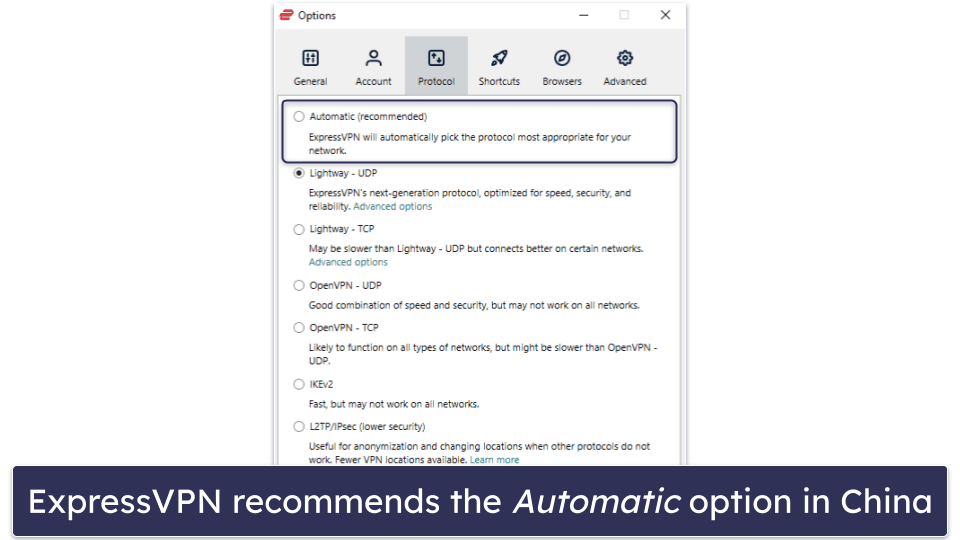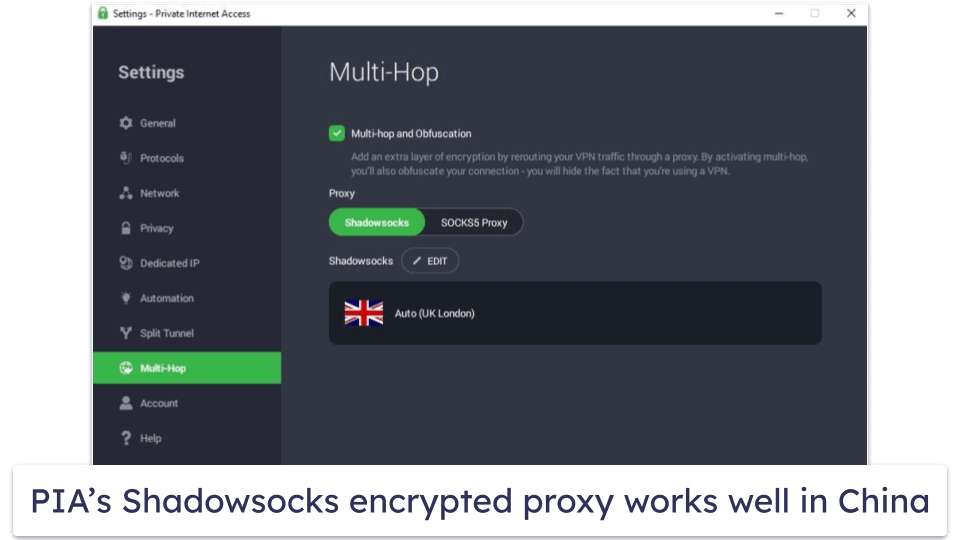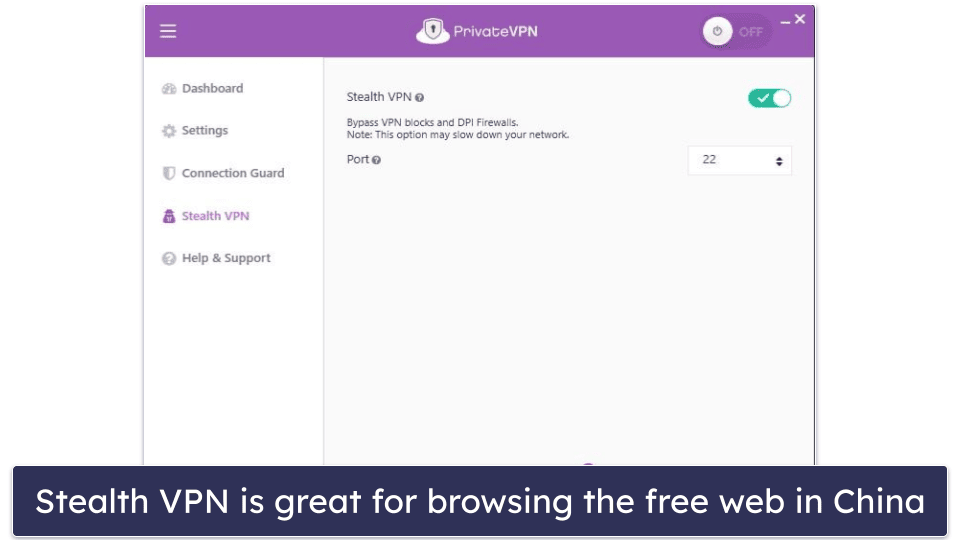
Raven Wu
Updated on: November 29, 2023
Short on time? Here’s the best way to download and set up a VPN in China in 2024:
- 1. Choose a VPN that works in China. This is important as not all VPNs work well in China. I recommend ExpressVPN.
- 2. Download and install the VPN. Follow the on-screen instructions in the installation wizard. If you’re planning a trip to China, it’s best to download the VPN on your devices before you arrive.
- 3. Enable the VPN’s obfuscation tool. For example, in ExpressVPN‘s apps, you just need to connect to a server using any protocol. Obfuscation hides your VPN traffic.
- 4. Connect to a server in another country. Once connected, you can freely browse the internet in China.
Internet access in China is heavily restricted. The Chinese government blocks access to a vast number of websites and apps that it deems against the country’s best interests.
The easiest way to freely browse the web in China is with a VPN. It’s an online tool that has servers located in countries all over the world. When you connect to a VPN server, it changes your IP address to match the corresponding country, which helps you visit blocked websites.
However, many VPN websites don’t work in China. Furthermore, not all VPNs consistently work in China, as the country-wide firewalls detect and block them.
But I found the best methods to download a VPN in China — and also the best VPNs to use there. My #1 choice is ExpressVPN — it comes with advanced obfuscation tools, high-end security features, blazing-fast speeds, and intuitive apps for all major platforms.
In China, it might be illegal to use VPNs that are not approved by the government. Still, there are no reports of the government taking legal action against foreigners or individuals for this reason — it has only fined and given prison sentences to Chinese citizens who have been found to illegally set up and sell unsanctioned VPNs. That said, it’s still important to exercise a certain level of caution when using a VPN in China. I don’t condone or endorse the use of a VPN to commit illegal activities and recommend adhering to all local laws and regulations.
Why Would You Need to Use a VPN in China?
The main reason to do this is to freely browse the web as a lot of popular sites, including platforms like Facebook, Twitter, and Instagram, are blocked in China. With a VPN, you can easily visit these websites and communicate with your friends and family — though, I only recommend this if it’s legal.
Additionally, a VPN provides better online privacy and security. For example, the best VPNs use 256-bit AES encryption, which prevents anyone from seeing which sites you visit. The Chinese government has a history of monitoring online activity, so using a VPN can help keep your online traffic private and protect your personal data.
Finally, VPNs are important for business or educational purposes. Many companies and universities use platforms that are not available in China, such as Google Drive or Dropbox, so a VPN may be necessary to access these tools and complete work tasks.
7 Best Ways to Download a VPN in China
I strongly recommend downloading a VPN on your device before leaving for China. This is the easiest way to get a VPN to use in the country.
But if that’s not an option, try these other methods:
1. Use Mirrored Links
Mirrored links are exact copies of a VPN provider’s website. They just use different web addresses, so it’s much harder for a government to detect and block them.
I can’t provide you with a list of VPN mirrored links because they change often. The best way to find a provider’s mirrored links is to contact its support team via email. Alternatively, if you know someone in a country that doesn’t censor the web, you can ask them to find the VPN provider’s mirrored links and send them to you.
2. Use Your Hotel’s Wi-Fi Network
Some Chinese hotels might use a VPN on their networks to freely access the web to some extent — so, you may be able to view some restricted content, but you’re unlikely to get access to a completely open internet. Still, this may allow you to visit VPN sites and download the VPN normally.
3. Use a Free Proxy to Access the VPN’s Site
A proxy changes your IP address to help you circumvent firewalls, but it doesn’t provide encryption so it can’t secure your traffic. You can easily find free proxies on the web or app store, and use them to visit the VPN provider’s website. Then, just download and install the provider’s app to your device.
4. Use a SIM Card from Another Country
Most VPN apps aren’t available in China on iTunes or Google Play. But if you have access to a SIM card from your home country and an international data plan, you may be able to download a VPN app on your device. A downside to this method is that it can be expensive.
Here’s what you need to do:
- Set your phone to roaming. This will allow you to see VPN apps on your device’s app store.
- Download and install a VPN. Make sure you choose a VPN that works well in China — I recommend ExpressVPN.
- Connect to the VPN. You can now switch back to your China SIM card and browse the internet freely.
5. Download an APK VPN App
APK files are an alternative way of getting a VPN on your phone. An APK file is a package file format used by the Android operating system for the distribution and installation of mobile apps. This method is usually reserved for instances where the app is not available on the app store.
Ask the VPN provider to send you the APK app over email — avoid downloading the app from third-party sources, as you might accidentally download a malicious file.
6. Ask Someone for Help
You can ask someone else to download the VPN files for you. This can be a friend or relative outside of China, or someone in China who has a VPN themselves. They can then send the VPN files to you through a file-sharing platform.
7. Visit Hong Kong or Macau
You could download a VPN normally in Hong Kong or Macau. They are semi-autonomous regions with fewer internet restrictions. So a quick day trip to these places is a good solution if all the other methods I recommend don’t work.
Best VPNs That You Can Download & Use in China in 2024
Quick summary of the best VPNs for China:
- 1. 🥇ExpressVPN — Best VPN for bypassing internet restrictions in China in 2024.
- 2. 🥈Private Internet Access — Highly customizable VPN with top-notch security.
- 3. 🥉PrivateVPN — Easy-to-use VPN with good speeds.
- Comparison of the Best VPNs That Work in China in 2024.
🥇1. ExpressVPN — Best Overall VPN for Bypassing Internet Restrictions in China in 2024
ExpressVPN is without a doubt the best VPN for China. It supports obfuscation on all of its servers and protocols, which allows you to hide your VPN traffic. But the provider’s support reps recommend using the Automatic protocol setting to get the best results.
It also has an impressive global server network with servers in 105 countries, including Hong Kong, Japan, and Singapore, which makes it easy to find a nearby server to get the fastest speeds.
Speaking of speeds, this provider is the fastest on the market, which is very important because obfuscation reduces your connection speeds. However, when I performed speed tests using ExpressVPN, all websites and videos loaded instantly, and HD and 4K videos played without any buffering.
ExpressVPN also comes with excellent privacy and security features, such as:
- Perfect forward secrecy. Generates a different key for every session, which prevents hackers from compromising your traffic if they somehow get access to a past or future encryption key.
- RAM-only servers. ExpressVPN writes data to volatile memory (RAM) instead of a hard drive. This means that all data is erased every time its servers are rebooted.
- Full leak protection. Protects you against DNS, IPv6, and WebRTC leaks, so your data is never exposed. I ran 10+ leak tests with this provider and I never experienced any leaks.
- An audited no-logs policy. ExpressVPN’s no-logs policy has undergone several independent audits, which confirmed that the provider doesn’t log any data.
- Threat Manager. Blocks ad trackers and malicious sites. In my tests, it stopped me from visiting shady sites 100% of the time.
- Ad blocker. Prevents annoying pop-up and banner ads from loading on most sites, improving your browsing experience and speeding up web page load times.
ExpressVPN also has split-tunneling, a feature that lets you pick which apps use the encrypted VPN tunnel and which app traffic goes through your regular internet connection. This allows you to use the VPN for apps you want to secure without having to turn off your VPN every time you need your local connection.
With plans starting at $6.67 / month, ExpressVPN is a bit pricey but well worth the cost — no other VPN offers the same combination of speeds, security, and reliability for accessing the web in China. All of ExpressVPN’s plans are backed by a 30-day money-back guarantee.
Read the full ExpressVPN review
🥈2. Private Internet Access — Highly Customizable VPN With Top-Notch Security
Private Internet Access (PIA) uses the Shadowsocks protocol, an encrypted proxy that works by disguising your VPN traffic as regular traffic, to allow you to browse the free and open web without detection.
I tested PIA’s speeds over a Shadowsocks connection and they were great. Websites loaded instantly and so did HD videos, while 4K videos only took 2 seconds to load. That said, ExpressVPN provided me with faster speeds over obfuscated connections.
PIA’s apps are very flexible, which makes it a great choice for advanced users. There are 20+ options in the Settings menu, including the ability to easily switch between 128-bit AES encryption for faster speeds and 256-bit AES encryption for maximum security, change VPN protocols (OpenVPN or WireGuard), and adjust proxy settings. On top of that, PIA allows unlimited simultaneous connections so you can use it on as many devices as you need.
Additionally, this provider has servers in 91 countries, including Macau, Hong Kong, Japan, and Singapore, so you get stable connections when accessing content outside the country.
PIA has very strong privacy and security features. It operates on RAM-only servers, uses perfect forward secrecy, provides full leak protection, and has an independently audited no-logs policy. I like that all of PIA’s apps are completely open-source, so anyone can check the code for security vulnerabilities. Plus, PIA has one of the best VPN ad blockers on the market (called MACE), which blocks ads, trackers, and shady sites.
Its split-tunneling feature is more versatile than ExpressVPN’s split-tunneling. In addition to allowing you to exclude apps from the VPN tunnel, it also lets you exclude website IP addresses, which is really convenient.
Private Internet Access is really affordable, with prices as low as $2.11 / month. Also, all subscriptions come with a 30-day money-back guarantee.
Read the full Private Internet Access review
🥉3. PrivateVPN — Easy-to-Use VPN With Good Speeds
PrivateVPN is a beginner-friendly option for freely browsing the web in China. It obfuscates traffic via its Stealth VPN feature, which works by disguising VPN traffic as normal HTTPS traffic.
PrivateVPN is a great pick for people new to VPNs. All apps come with an intuitive interface that makes it super easy to connect to any of its servers in mere seconds. Plus, PrivateVPN’s apps offer 2 different viewing modes — Simple View, which is great for anyone that wants to quickly connect to a server and forget about the VPN app, and Advanced View, which is better if you want to customize your VPN connection.
This provider maintains pretty good speeds. in my tests while using Stealth VPN, sites and HD videos loaded in 2 seconds, and 4K videos in 4 seconds. The speeds were good but failed to match ExpressVPN and Private Internet Access.
It has a relatively small server network of 200+ servers in 63 countries, but its server locations include Hong Kong, Japan, South Korea, Singapore, and Taiwan, so you have plenty of servers near China to choose from.
PrivateVPN’s security features are decent, but they’re not as comprehensive as the ones you get with ExpressVPN or Private Internet Access. It uses perfect forward secrecy and has DNS and IPv6 leak protection, but PrivateVPN lacks RAM-only servers and WebRTC leak protection.
PrivateVPN’s plans start at $2.00 / month and there’s a 30-day money-back guarantee on all purchases.
Read the full PrivateVPN review
Comparison of the Best VPNs That Work in China in 2024
How to Choose a VPN That You Can Download & Set Up in China
- Select a VPN that works in China 24/7. The VPNs on this list all have features that can effectively obfuscate your VPN traffic.
- Prioritize VPNs with strong encryption and privacy features. All the VPNs I recommend use industry-standard VPN security features like 256-bit AES encryption, a kill switch (disconnects you from the internet if your VPN connection drops), a strict no-logs policy to prevent the VPN from logging your IP address and traffic, and protection against IPv6, DNS, or WebRTC leaks.
- Pick a VPN with fast connection speeds. All VPNs slow down your internet connection due to the encryption-decryption process, and obfuscation curbs them even more. So, it’s important to get a VPN with fast speeds — ExpressVPN is the fastest VPN on the market and maintains excellent speeds even with obfuscation.
- Choose a VPN with a large server network. I recommend choosing VPNs that have servers located in countries neighboring China, to ensure fast connection speeds.
- Choose a VPN that provides good value. Every VPN on my list is reasonably priced, offers user-friendly apps that are compatible with multiple platforms, and allows at least 5 simultaneous connections. Additionally, they all come with a generous 30-day money-back guarantee.
Top VPNs That Don’t Work in China
- CyberGhost VPN. CyberGhost VPN is one of the best VPNs on the market. It’s fast, secure, and great for streaming and gaming. But it doesn’t have obfuscated servers, so it doesn’t work well in countries with internet restrictions.
- NordVPN. NordVPN is a fast VPN that comes with very strong security features, including obfuscated servers, but it doesn’t work in China.
- Surfshark. Surfshark allows unlimited connections and has Camouflage Mode, which obfuscates traffic. Even so, the provider doesn’t work in countries like China.
- Proton VPN. Proton VPN includes high-end security features and a very good free plan with unlimited data. But its support reps told me that the VPN doesn’t work in China.
Frequently Asked Questions
What is China’s policy on VPN usage?
Using a VPN in China is technically illegal. The Chinese government has banned most VPNs and only allows using VPNs that it approves of.
But I haven’t found reports of foreigners being fined or punished for using a VPN. According to all of the articles and online posts I read, the Chinese government only punishes Chinese citizens that run or sell illegal VPNs with fines or jail time. That said, I strongly advise researching the local laws of the region you’re traveling to in order to make sure you don’t risk any fines or penalties for using a VPN.
That said, I strongly advise researching the local laws of the region you’re traveling to in order to make sure you don’t risk any fines or penalties for using a VPN.
What is the best VPN for China?
ExpressVPN is the best VPN for China in 2024. It supports obfuscation in all 105 countries, has strong security, fast connection speeds, and easy-to-use apps for all major platforms.
Which VPN country should I use when in China?
Choose a VPN server in a country that’s geographically close to minimize latency and maintain fast connection speeds. My top pick, ExpressVPN, offers obfuscated servers in Hong Kong, Japan, South Korea, and Taiwan, and it also maintains the fastest speeds on the market.
Do any free VPNs work in China?
While there are many free VPNs out there, they’re unlikely to work in China. Additionally, free VPNs often come with limitations on data usage, security features, connection speeds, and server locations, which can be frustrating.
So, I recommend getting an affordable VPN instead, like ExpressVPN — it has a proven track record of consistently working in restrictive countries like China, and it also comes with high-end security and privacy features, lightning-fast speeds, servers in 105 countries, and very user-friendly apps.








